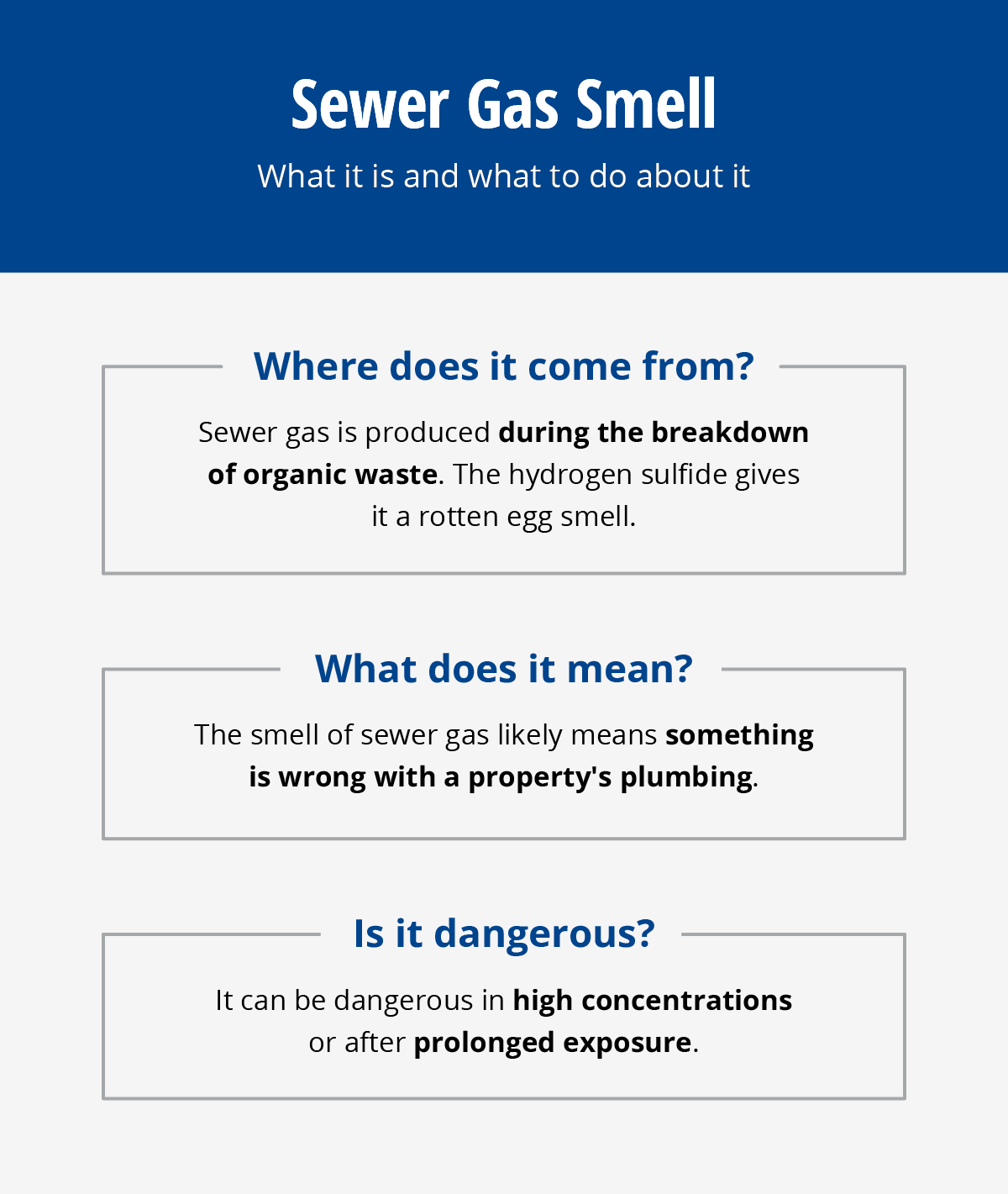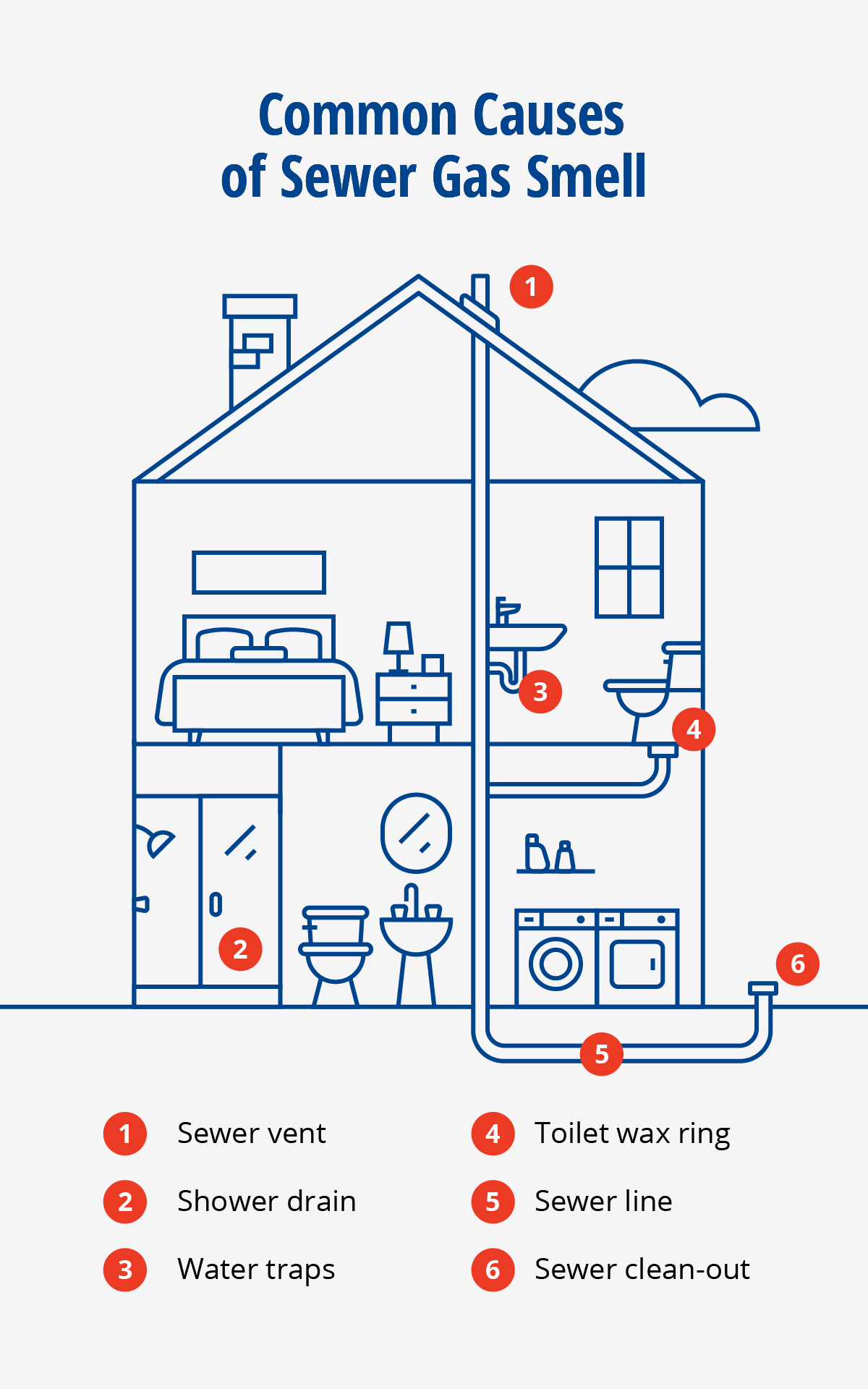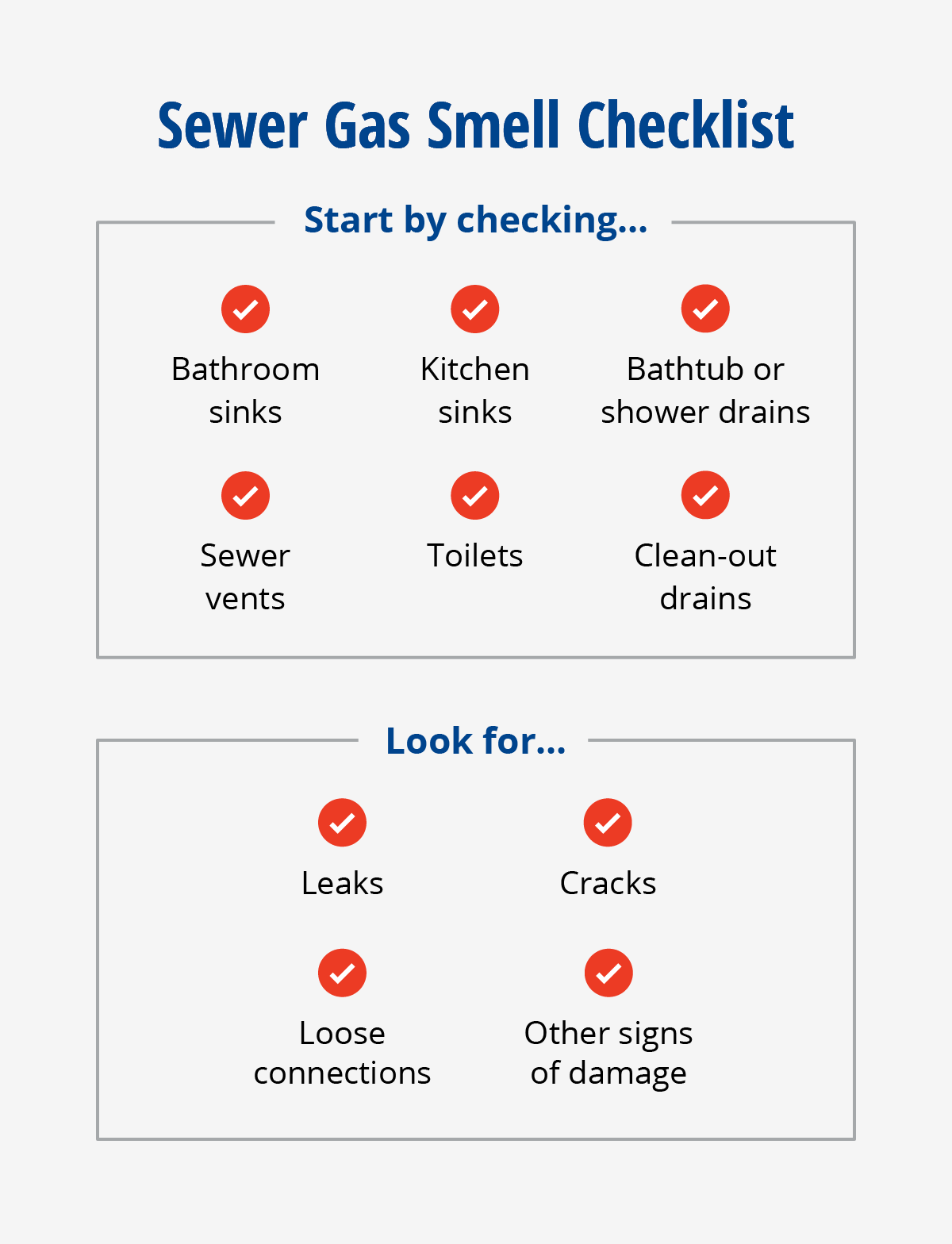.webp)
Sewer gas smells in your home can signal underlying plumbing issues and pose health risks. Rainbow Restoration highlights some key causes and solutions:
|
Sewer gas smells like rotten eggs, usually indicating plumbing issues. While exposure to high concentrations of the gas can cause serious health problems, it's generally not a cause for concern. Professionals can quickly remedy the issue and eliminate any lingering odors.
Any unusual smell inside a building — especially a sewer-like smell — should be taken seriously. A sewer gas smell is often a sign of plumbing issues, like a sewage backup in the basement or damaged drains.
While it's easy to confuse the smell of sewer gas with a natural gas leak, as both can smell like rotten eggs, natural gas smells a bit more like the spray from a skunk than raw sewage. In this guide, we’ll explain more about the causes of a sewer gas smell, how to identify the source, and when to call a professional for sewage cleanup services.

What Does Sewer Gas Smell Like?
Sewer gas has a distinct odor that smells like rotten eggs. When organic matter breaks down, it produces a mix of chemicals, including methane, hydrogen sulfide, ammonia, carbon dioxide, hydrogen, and nitrogen. Hydrogen sulfide, in particular, produces that eggy stench.
Is Sewer Gas Dangerous?
Hydrogen sulfide, or "sewer gas," is more than just an unpleasant odor. It's a toxic gas that can be extremely dangerous in high concentrations or after prolonged exposure. While this is common in industrial settings like wastewater treatment plants or petroleum drilling sites, it's still helpful to be aware of the health implications of sewer gas in residential and commercial settings.
Exposure to hydrogen sulfide in low concentrations can cause a cough, shortness of breath, or irritation of the eyes, nose, and throat. The health risks increase with exposure to moderate concentrations and may result in:
- Severe irritation of the respiratory system
- Difficulty breathing
- Dizziness
- Headache
- Nausea
- Vomiting
Exposure to high concentrations of sewer gas may lead to serious health problems, including shock, convulsions, organ damage, and even death. Hydrogen sulfide is also extremely flammable and is a high risk of fire or explosion.
While minimizing sewer gas smell from a property could be addressed with a DIY approach, eradicating the smell may also necessitate professional odor removal services. Services offered by an experienced odor removal company like Rainbow Restoration® can quickly find and address the source of the smell, keeping the building and its occupants safe from any potential risks.
8 Common Causes of Sewer Gas Smell
The smell of sewer gas on a property shouldn't be ignored. Here are eight of the most common causes of a sewer gas smell. An experienced odor removal professional will be able to quickly identify the source of the smell and determine the best way to eliminate it.
1. Dry Water Traps or Drains
Water traps, like P-traps and S-traps, are plumbing attachments located underneath sinks and other drains. They trap water inside to create a barrier, preventing sewer gas from entering a building.
However, the traps can dry out if they're not used often or if there's a leak in the pipe, giving the gas full access to the interior of the building.
2. Damaged Sewer Vents or Lines
Damaged sewer vents or lines allow water and gas to escape from a plumbing system, causing that dreaded sewer gas smell. Look for signs of a water leak, like dripping, standing water, or water damage.
3. Sewer Line Backup
Sewer line backups can occur for various reasons, including heavy rainfall, clogged pipes, tree roots, or an aging sewer system. A foul odor is often the first sign of a sewer line backup, but slow drains, gurgling noises, and overflowing toilets and sinks may also indicate a sewer line issue. Don't ignore these signs — turn off the building's water supply and call a professional for sewage backup cleanup.
4. Wax Ring Leakage
A wax ring connects the base of a toilet to the drainage system, keeping water and gas inside the fixture. Signs of a damaged wax ring include leaks, an unstable toilet, and a stinky smell coming from the base of the toilet. Individuals may be able to replace the wax ring themselves, but a plumber can also get the job done quickly and easily.
5. Incorrectly Installed Plumbing Fixtures
Just like the wax ring keeps water and gasses inside the toilet, other plumbing fixtures like traps and vents require proper installation to keep the sewer gas smell at bay. This means they have a secure seal, trapping foul odors inside the fixture and keeping them out of the building. Call a plumber to identify and fix improperly installed or damaged plumbing fixtures.
6. Blocked Drains or Vents
It's not uncommon for drains and vents to get clogged over time with debris or residue buildup. This issue prevents proper airflow and drainage throughout the system, allowing sewer gasses to seep into a building. Cleaning a smelly drain will keep things functioning properly and prevent future blockages.
7. Broken or Missing Clean-Out Caps or Plugs
The drain clean-out is a pipe that connects a plumbing system to the main underground sewer line — clean-out caps shield the entrance to that pipe. Since clean-out caps block sewer gas smells and keep rainwater, pests, and debris from clogging the clean-out, a missing or broken cap could be the reason for a sudden stench. Fortunately, they're fairly easy to replace.
8. Residual Odor From Sewage Backup
Raw sewage is toxic waste, so a sewage backup can leave a property and its occupants exposed to various health hazards. Even if the sewage backup in a basement was treated, some smells may linger. Request an appointment with a service professional to remove the odor and return the property to its best possible condition.

How To Identify the Source of the Smell
To find the source of that stinky smell, turn to the building's plumbing system. Check sinks, drains, toilets, and other plumbing fixtures for obvious signs of damage, leaking, or loose connections. It's also good to check sewer vents and the clean-out drain outside the building.
While these are common sources of a sewer gas smell, it may be something more serious that requires professional restoration. Contact professionals to identify the source and get rid of the smell once and for all.

When To Contact a Professional for Sewer Smells
If simple home remedies like running the water in seldom-used bathroom sinks and cleaning out clogged drains don't eliminate the smell, it's time to contact a professional. While the source of the odor could certainly be due to minor plumbing issues, it could also be something bigger that requires professional restoration expertise.
Experienced professionals can access specialty equipment that is unavailable to many home or business owners. They can:
- Extract excess water after a sewage backup
- Dry carpet and other affected materials
- Identify and remove mold
- Eliminate odors
Don't risk turning a small problem into something catastrophic. When in doubt, call a professional for sewage cleanup and odor removal services.
FAQ About a Sewage Smell
What Does Sewer Gas Smell Like?
Sewer gas smells like rotten eggs. Some people may mistake the odor for methane gas, but methane is actually odorless. Hydrogen sulfide is what gives raw sewage its characteristic stench.
Should You Leave Your House If You Smell Sewer Gas?
While unpleasant, most instances of a sewer gas smell do not pose a serious health risk. However, mild exposure to low concentrations of hydrogen sulfide present in sewer gas could cause irritated eyes, nose, or throat. If this is the case, leave the property until a professional arrives.
Is It Harmful To Smell Sewer Gas?
It can be harmful to smell sewer gas in high concentrations or for prolonged periods. Though rare, severe exposure could result in organ damage or even death in extreme cases.
Contact Rainbow Restoration for Sewage Cleanup Services
Whether minor plumbing issues caused the sewer gas smell or the odor is leftover from a sewage disaster, your local Rainbow Restoration team can help. Rainbow Restoration professionals have the training and proper equipment to perform sewage backup cleanup and remove any lingering odors to get the property back to normal as soon as possible.
This article is intended for general informational purposes only and may not be applicable to every situation. You are responsible for determining the proper course of action for your property. Services should be performed by licensed and experienced professionals. Rainbow Restoration is not responsible for any damages that occur as a result of this blog content or your actions. For the most accurate guidance, contact a Rainbow Restoration professional for a custom, on-site assessment.

![Clickable graphic directing to Rainbow Restoration's blog How To Find a Water Leak Inside a Wall [6 Quick Steps].](/us/en-us/rainbow-restoration/_assets/images/how-to-find-water-leak-inside-wall-cta.webp)
